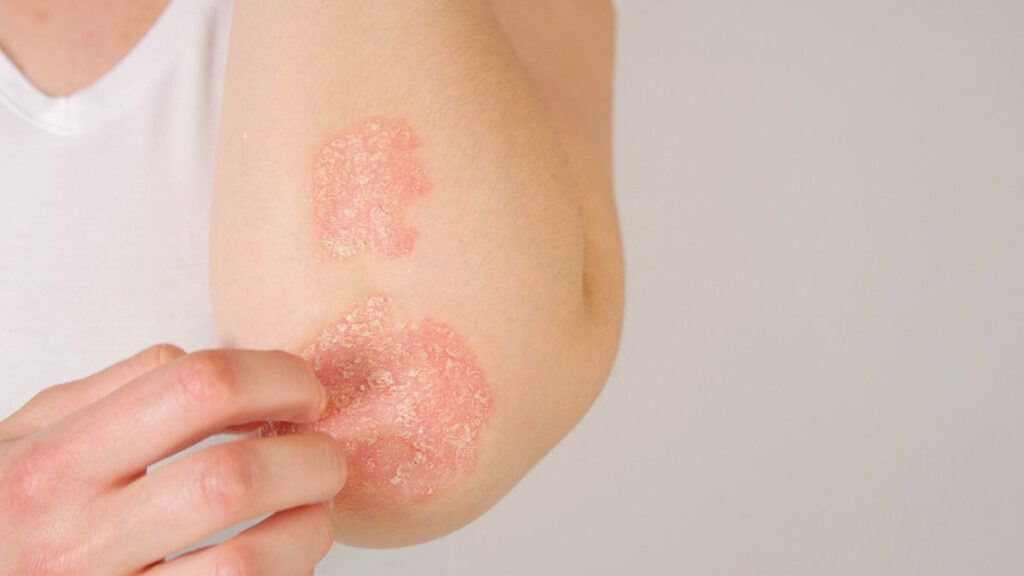Have you noticed red, flaky patches on your skin that just won’t go away, no matter what creams or remedies you try?
Maybe your scalp feels constantly itchy, or your joints ache without explanation. While these signs might seem minor at first, they could indicate psoriasis — a chronic, immune-related condition that affects more than just the skin. Left untreated, it can impact your joints, heart, and even mental well-being.
What Is Psoriasis?
Psoriasis occurs when the immune system becomes overactive, prompting skin cells to multiply far faster than normal. This overproduction leads to inflamed, scaly patches that can be itchy, painful, or even crack and bleed. Common locations include the scalp, elbows, knees, and trunk, though psoriasis can appear anywhere.

Although the exact cause remains unclear, research shows that genetics and environmental triggers both play roles. Symptoms often appear in cycles: flare-ups can last weeks or months, followed by periods of remission.
Common Treatments
Treatment strategies depend on severity and type:
Mild cases: Usually respond well to medicated creams, ointments, or moisturizers.
Moderate to severe cases: May require oral medications, biologic injections, or light therapy (phototherapy).
Managing lifestyle factors — stress, skin injuries, and certain medications — can also reduce the frequency and severity of flare-ups.
Beyond the Skin: Potential Complications
Psoriasis is far more than a cosmetic issue. People with the condition face increased risks of:
Psoriatic arthritis: Chronic joint pain, swelling, and stiffness that can lead to permanent damage.
Cardiovascular problems: Including heart attack and stroke.
Mental health struggles: Anxiety, depression, and lowered self-esteem.
Other health concerns: Diabetes, Crohn’s disease, obesity, liver and kidney disease, metabolic syndrome, and even some cancers.
Who Can Get Psoriasis?
Anyone can develop psoriasis, though it’s more common in adults than children. Men and women are equally affected, and having a family history of the disease increases your risk.
Types of Psoriasis
Plaque Psoriasis (Most Common): Raised red patches covered with silvery scales, usually on both sides of the body.
Guttate Psoriasis: Small red spots often triggered by infections like strep throat; more common in children and young adults.
Pustular Psoriasis: Pus-filled bumps surrounded by redness, usually on hands or feet; triggered by stress, chemicals, or medications.
Inverse Psoriasis: Smooth red patches in skin folds (armpits, groin, under breasts) that worsen with friction and sweating.
Erythrodermic Psoriasis (Rare but Severe): Widespread redness and scaling, often triggered by sunburn, medications, or uncontrolled psoriasis.
Typical Symptoms
Thick, red, scaly skin that may itch or burn.
Dry, cracked skin that can bleed.
Pitted or thickened nails.
Joint stiffness or pain (psoriatic arthritis).
Fatigue and sleep disturbances during severe flares.
Early diagnosis is especially important to prevent permanent joint damage from psoriatic arthritis.
Why Psoriasis Occurs
Psoriasis is immune-mediated, meaning the immune system mistakenly attacks healthy skin cells, speeding up their production. Genetics play a significant role, with certain genes affecting immune responses. Other triggers include:
Infections such as strep throat or HIV.
Certain medications for heart disease, malaria, or mental health conditions.
Smoking and excessive alcohol use.
Obesity and chronic stress.
Conclusion
Psoriasis is not merely a skin condition — it’s a complex disease that can affect the whole body and your overall quality of life. If you notice persistent red, scaly patches, unexplained joint pain, or other symptoms, consult a dermatologist promptly. Early diagnosis and proper treatment can help manage flare-ups, prevent complications, and improve your day-to-day well-being.
